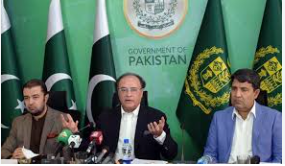Pakistan need to send delegation to US after tariffs imposition. Finance Minister Muhammad Aurangzeb said on Saturday that Pakistan will send a senior delegation to Washington. To talk with the Trump administration after the U.S. put new tariffs on Pakistani goods.
At a press conference, Aurangzeb said the plan for the delegation for the tariffs will be finalized. Once Prime Minister Shehbaz Sharif gives his approval. He added that a steering committee and a joint working group will prepare suggestions to deal with the issue. Pakistan wants to work with the US to find a solution that benefits both sides.
“We want to clearly explain our point of view and show that, in the medium to long term. Therefore this can be a win-win situation for both Pakistan and the US,” said Finance Minister Aurangzeb.
Aurangzeb, an experienced banker, said that Pakistan sees this issue not just as a problem. Also as an opportunity to strengthen economic ties with the US, which is Pakistan’s biggest export market.
He said the US is a key trade and strategic partner. The government is working on a complete plan to deal with the situation.
The minister also said that Pakistan’s financial arrangements with China—like loan rollovers. EXIM Bank refinancing, and improved trade facilities—are going ahead as planned. But he did not give specific details.
When reporters asked for more information after the press conference, Aurangzeb said Pakistan’s foreign financing needs are being met through the current IMF program, which has recently reached a staff-level agreement.
Pakistan seeks tariff solutions in US talks
Finance Minister Aurangzeb said the government will not give subsidies to any sector to deal with the US tariffs. He explained that the US has introduced a 10% general tariffs on all countries. An extra 29% tariff on Pakistani goods will start on April 9, 2025.
Talking about Pakistan’s economy, the minister avoided using words like “boom and bust,” but admitted that the country has a history of becoming stable and then making poor decisions that drained foreign reserves and caused financial problems. He said the government is now focused on keeping the economy stable through export growth and support for the private sector. The goal is to make real, long-term changes to the economy.
Aurangzeb also said Pakistan is making good progress with the IMF. The country has met all the required targets, which will lead to receiving a $1 billion payment under the Extended Fund Facility. In addition, a new agreement under the Resilience Sustainability Facility (RSF) will provide more funds over the next 28 months. “We have agreed to 13 reforms under the RSF,” he added.
In a major development, the finance minister said that all provinces have agreed to start collecting Agriculture Income Tax, and the process is now moving forward.
Talks to tackle US tariffs and trade challenges
He also mentioned that an IMF team is currently in Pakistan to check how the government is doing in terms of governance and fighting corruption. However, he made it clear that this visit is not about the upcoming budget.
The minister said another IMF team may visit Pakistan next month to discuss the 2025-26 budget. He called this a regular part of Pakistan’s work with the IMF. He also said Pakistan has asked the IMF for help in some technical areas.
Talking about the country’s economic progress, the minister shared several positive updates. He said foreign exchange reserves have grown, thanks to a 32% increase in remittances, which are expected to reach $36 billion by June 2025. The State Bank’s reserves are likely to rise to $13 billion, helped by a 7% increase in exports.
Inflation has dropped a lot — down to just 0.7% in one month — which has allowed the government to cut the policy interest rate from over 22% to 12%. There may be more rate cuts in the future.
The finance minister said that the benefits of a stable economy will be shared with the people. The government will continue to focus on growing exports and supporting the private sector. It also plans to increase the tax-to-GDP ratio, cut spending by reducing the size of ministries and 400 related departments, and make changes to the pension system.
Aurangzeb shared new data from the Pakistan Bureau of Statistics, showing that people spent Rs870 billion during Eid this year, up from Rs720 billion last year. He also mentioned that higher cement sales and more car sales are signs that Pakistan’s economy could grow by around 3% this year.
He said the Economic Coordination Committee (ECC) is working to control inflation. The ECC is watching inflation closely and has started new steps to keep track of it. A new system is also being set up to monitor the prices of important everyday items.
The finance minister said that reports from PWC and the Overseas Chamber show that the Business Confidence Index has gone up, meaning investor trust has returned. Local investors are also investing more, and there’s been an increase in stock market investments.
Looking ahead, he shared the government’s main priorities. These include tax reforms, fixing the energy sector, improving state-owned companies, and privatizing PIA, some banks, and three electricity distribution companies (Discos).
You can get more Info at this link: New IMF Loan Hinder Development For Pakistan.

Leave a Reply